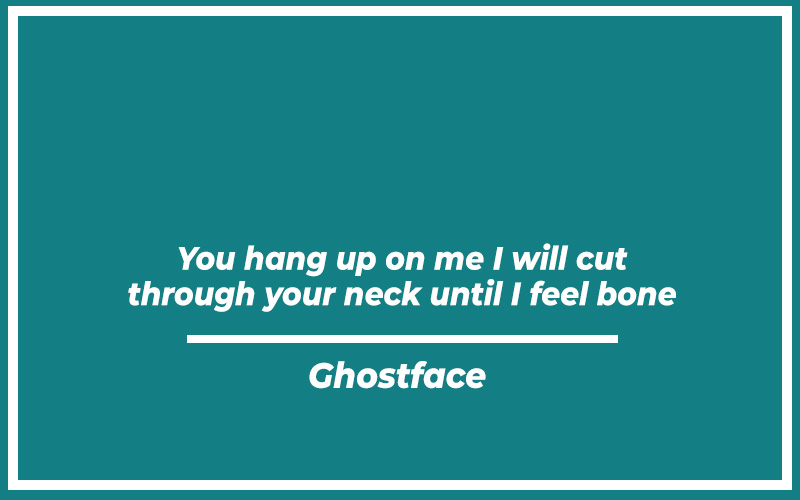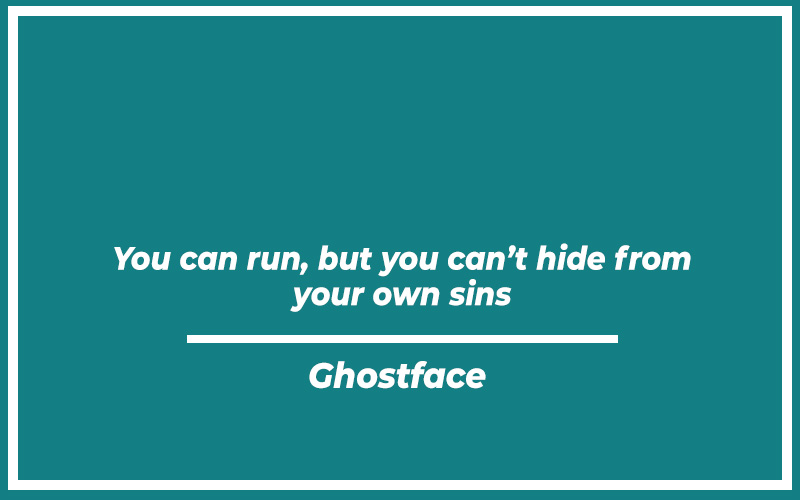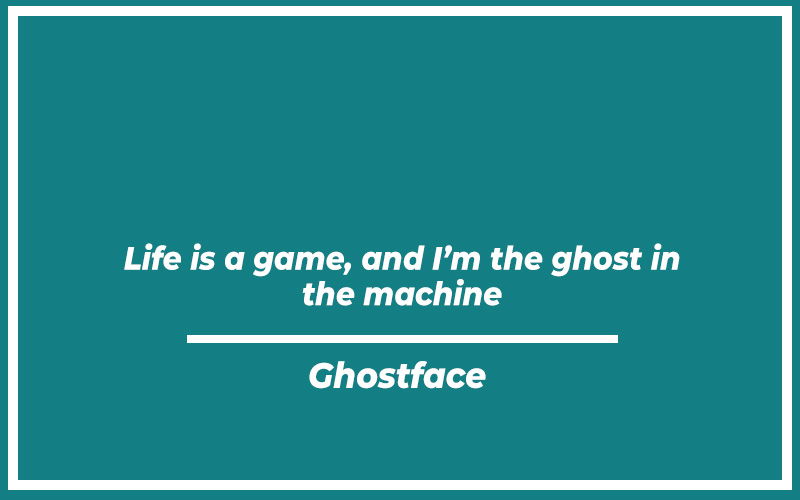The “Scream” franchise is a horror classic known for its masked killer, Ghostface, and his chilling taunts. The movies center around a group of teenagers who are stalked and murdered by a mysterious figure dressed in a black robe and a white ghost mask.
Ghostface isn’t just any slasher villain; he enjoys toying with his victims both physically and mentally. Let’s take a look at some of the quotes that show just how twisted he is.
Ghostface Quotes

“You hang up on me I will cut through your neck until I feel bone!” – Ghostface
This quote epitomizes the terrifying nature of Ghostface, showing the character’s relentless and brutal persona. The threat is direct and vivid, evoking a sense of immediate danger and highlighting the killer’s sadistic enjoyment of instilling fear. It’s a classic example of how horror villains use psychological terror to paralyze their victims before the physical attack.
Ghostface’s words are not just meant to scare; they are a promise of the gruesome violence that is to come, creating an atmosphere of inevitable doom.
“Would you like to play a game, Tara?” – Ghostface
Ghostface’s approach often involves playing with his victims’ minds, as seen in this quote. The sinister invitation to a “game” foreshadows a series of deadly challenges that the victim must face. This method of toying with his prey before striking is a hallmark of his character, adding layers to the horror as the anticipation of violence builds.
The psychological torment inflicted by the prospect of a deadly game makes the threat even more horrifying, as it strips the victim of any sense of control or safety.
“What you really should be asking is, did you just lock me in or out?” – Ghostface
This quote showcases Ghostface’s cunning and the psychological games he plays with his victims. By questioning whether he is inside or outside, Ghostface instills a deep sense of paranoia and fear. It blurs the line between safety and danger, making the victim question their own actions and surroundings.
This manipulation heightens the suspense and terror, as the victim is left feeling vulnerable and exposed, unsure of where the threat is coming from.
“There are two main doors to your house. The front door and the back patio door. If you answer correctly, you may live. Very simple.” – Ghostface
Ghostface often uses detailed knowledge of his victims’ environments to his advantage, as illustrated in this quote. By mentioning the specific doors, he demonstrates his familiarity with the victim’s home, which amplifies the fear.
The seemingly simple choice between two doors becomes a life-or-death decision, emphasizing the stakes and the killer’s control over the situation. This method of using ordinary details to create extraordinary fear is a testament to Ghostface’s psychological prowess.
“See, it’s a fun game, Sidney. We ask you questions and if you get one wrong, boo-gah, you die.” – Ghostface
In this quote, Ghostface lays out the deadly rules of his game, combining a casual tone with a life-threatening ultimatum. The contrast between the playful language and the lethal consequences highlights his sadistic nature.
By framing murder as a game, Ghostface dehumanizes his victims and takes pleasure in their terror. This approach makes the horror more personal and intimate, as the victim’s knowledge and reactions directly determine their fate, adding a chilling layer of psychological torment.
“You’ll die when I want you to, Sidney, not a moment before. Until then, you’re going to suffer!” – Ghostface
Ghostface’s control over his victims’ fate is starkly portrayed in this quote. By asserting his dominance over Sidney’s life and death, he emphasizes the power he holds. The promise of prolonged suffering before death serves to heighten the victim’s fear and sense of helplessness.
This manipulation of time and suffering is a key tactic in Ghostface’s arsenal, making the experience of terror drawn-out and excruciating, as the victim is left to dread not just death, but the agony that precedes it.
“Do you like scary movies?” – Ghostface
This iconic line from Ghostface taps into the meta-narrative of the Scream franchise, where horror movies and real-life terror intersect. By referencing the genre itself, Ghostface blurs the lines between fiction and reality, making the horror more relatable and immediate. This self-awareness adds a unique twist to the terror, as it acknowledges the audience’s familiarity with horror tropes while subverting them.
The question itself becomes a chilling reminder that the safe distance of watching a scary movie can quickly dissolve into real-life fear and danger.
“We’ll rip you up, you btch, just like your fcking mother!” – Ghostface
This quote reveals the brutal and unapologetic cruelty of Ghostface. The reference to the victim’s mother not only adds a deeply personal layer to the threat but also serves to intensify the fear and emotional pain.
Ghostface’s ability to exploit such intimate details about his victims exemplifies his sadistic pleasure in not just killing but also psychologically torturing them. This approach makes the horror more profound and impactful, as it strikes at both the physical and emotional vulnerabilities of the victim.
“I’m going to slit your eyelids in half so you don’t blink when I stab you in the face.” – Ghostface
Ghostface’s graphic and horrifying threat in this quote underscores his sadistic nature. The specificity of the violence described creates a visceral image that is meant to terrify. By focusing on such a gruesome detail, Ghostface ensures that the fear is not just about the impending death but also about the excruciating pain and suffering that will precede it.
This kind of psychological torment is a hallmark of his character, making the anticipation of violence almost as terrifying as the act itself.
“What do you want?” “To see what your insides look like.” – Ghostface
This exchange highlights Ghostface’s morbid curiosity and the pleasure he takes in his acts of violence. The straightforward yet chilling response to a desperate question adds to the horror. By expressing a desire to see the victim’s insides, Ghostface dehumanizes his prey, reducing them to mere objects of his sadistic fascination.
This approach not only terrifies the victim but also emphasizes the killer’s complete lack of empathy and his enjoyment of the macabre, making the threat more unsettling.
“There are certain rules that one must abide by in order to successfully survive a horror movie.” – Randy (explaining Ghostface’s logic)
This quote from Randy, while explaining Ghostface’s modus operandi, adds a meta layer to the horror. By referencing the “rules” of surviving a horror movie, it acknowledges the genre’s clichés while also highlighting Ghostface’s methodical approach to his killings.
This self-awareness makes the audience complicit in the terror, as they recognize the familiar tropes but are forced to see them play out in brutal reality. It blurs the lines between fiction and reality, making the horror more immediate and relatable.
“Careful. This is the moment when the supposedly dead killer comes back to life, for one last scare.” – Randy
This quote plays on a classic horror movie trope, adding a layer of irony and self-awareness to the Scream series. By explicitly stating what is about to happen, it both builds anticipation and subverts expectations.
The acknowledgment of this common horror narrative device adds depth to the story, making the audience question what they know about horror conventions. It serves to both comfort and unsettle, as viewers realize that even their familiarity with the genre’s rules won’t necessarily save them from the terror.
“You sick fcks. You’ve seen one too many movies!”* – Sidney
Sidney’s outburst reflects her realization of the killers’ twisted motivations and their obsession with horror movies. This quote highlights the theme of how media influences behavior, a recurring element in the Scream series.
Sidney’s anger and horror at the killers’ rationalization of their actions through movie tropes underscore the blurred lines between reality and fiction. It serves as a critique of how violent media can desensitize individuals and how some might use it to justify their heinous acts.
“You think you know fear? You haven’t met me yet.” – Ghostface
Ghostface’s taunt here is a direct challenge to his victim’s perception of fear. By asserting that they haven’t truly experienced fear until encountering him, Ghostface positions himself as the ultimate embodiment of terror.
This quote not only instills dread but also emphasizes the killer’s arrogance and confidence in his ability to instill unparalleled fear. It serves to heighten the psychological torment, as the victim is made to feel that whatever horrors they have imagined are nothing compared to what Ghostface has in store.
“No, you listen to me you little btch! You hang up on me again and I’ll gut you like a fish!”* – Ghostface
This quote showcases Ghostface’s ruthless aggression and his tendency to control the conversation through intimidation. The violent imagery used here is intended to paralyze the victim with fear, making them more compliant and easier to manipulate.
By threatening such a gruesome fate, Ghostface not only instills terror but also demonstrates his willingness to follow through on his threats. This tactic ensures that the victim remains on edge, increasing the psychological pressure and the horror of the situation.
“It was a simple game, Cotton, you should have told me where Sidney was. Now you lose!” – Ghostface
Ghostface’s penchant for playing games with his victims is evident in this quote. By framing the deadly situation as a game, he dehumanizes his victims and takes sadistic pleasure in their suffering. The reference to losing underscores the fatal consequences of not playing by his rules.
This approach highlights the unpredictability and danger of underestimating Ghostface, as his games are rigged against his victims from the start, ensuring that their chances of survival are slim.

“You can run, but you can’t hide from your own sins.” – Ghostface
This quote delves into the psychological torment that Ghostface inflicts on his victims. By suggesting that they cannot escape their own sins, he amplifies their fear and guilt. This tactic of using personal failings and secrets against his victims makes the horror more intimate and devastating.
It reveals Ghostface’s deep understanding of human psychology and his ability to exploit it to create a sense of inescapable doom, where the victim is haunted not just by the physical threat but by their own inner demons.
“What’s the matter, Sidney? You look like you’ve seen a ghost.” – Ghostface
This quote plays on the double entendre of Ghostface’s identity and the supernatural connotations of seeing a ghost. It adds a layer of irony and dark humor to the situation, while also emphasizing the psychological impact of Ghostface’s presence.
By drawing attention to Sidney’s fear, Ghostface revels in his ability to terrorize and control her emotions. This manipulation deepens the sense of dread, as it underscores the killer’s enjoyment in watching his victims’ terror unfold.
“The question isn’t who am I? The question is where am I?” – Ghostface
This quote exemplifies Ghostface’s psychological warfare tactics. By shifting the focus from his identity to his location, he keeps his victims in a constant state of anxiety and paranoia. The uncertainty about his whereabouts adds to the fear, as the victim is never sure when or where he will strike next.
This tactic of creating a pervasive sense of danger and unpredictability is central to Ghostface’s method, making every moment fraught with the possibility of sudden violence.
“Lucky for you there’s a bonus round, but poor Steve—I’m afraid he’s out!” – Ghostface
Ghostface’s use of game show language to describe life-and-death situations adds a chilling layer of detachment to his character. By referring to a “bonus round,” he trivializes the horror and makes it seem like a game, which dehumanizes his victims.
This flippant attitude toward life and death underscores his sadistic nature and his enjoyment of the power he holds over his victims. It also highlights the arbitrary nature of survival in Ghostface’s games, where luck, rather than skill or bravery, often determines who lives and who dies.
“Are you alone in the house?” – Ghostface
This quote is a classic example of Ghostface’s ability to instill paranoia and fear. By questioning the victim’s solitude, he forces them to confront their vulnerability and the potential dangers lurking in their seemingly safe environment.
This tactic effectively isolates the victim mentally, heightening their sense of helplessness. The simplicity of the question belies the terror it induces, as it plays on the fundamental human fear of being alone and unprotected when danger is imminent.
“This is the last person you’ll ever see alive.” – Ghostface
Ghostface’s ominous declaration underscores his control over life and death. By making such a definitive statement, he not only terrifies the victim but also asserts his dominance and power.
This quote highlights the fatalistic aspect of Ghostface’s terror, where he becomes the arbiter of the victim’s fate. It amplifies the horror by making the threat immediate and inescapable, creating a sense of impending doom that looms over the victim.
“The shadows are my allies, and they’re coming for you.” – Ghostface
This quote showcases Ghostface’s use of darkness and the unknown to his advantage. By aligning himself with the shadows, he emphasizes his ability to strike from anywhere, unseen and undetected.
This imagery taps into primal fears of the dark and the unknown, making the threat more abstract and terrifying. It also portrays Ghostface as an omnipresent menace, capable of attacking at any moment, which keeps the victim in a state of constant anxiety and fear.
“You can lock your doors, but you can’t lock out the fear.” – Ghostface
This quote highlights the futility of trying to escape Ghostface’s terror through physical means. By stating that fear cannot be locked out, Ghostface emphasizes the psychological aspect of his terror.
This quote suggests that no matter how secure the physical barriers, the mental and emotional torment he inflicts will always find a way in. It underscores the pervasive and insidious nature of fear, which can penetrate even the most secure defenses, leaving the victim perpetually vulnerable.
“Fear is my weapon, and you’re my target.” – Ghostface
Ghostface’s admission that he uses fear as a weapon underscores his psychological approach to terror. By targeting his victims’ fears, he ensures that his attacks are deeply personal and effective. This quote highlights the calculated nature of Ghostface’s methods, where instilling fear is as important as the physical violence.
It emphasizes the psychological warfare at play, where the victim is constantly tormented by their own fears, making the horror more profound and inescapable.
“There’s nothing scarier than the torment of your own mind.” – Ghostface
This quote delves into the psychological horror that Ghostface inflicts on his victims. By acknowledging that the mind’s torment can be the scariest aspect, Ghostface emphasizes the internal struggle his victims face.
This approach makes the fear more intimate and personal, as it suggests that the real horror lies within the victim’s own thoughts and emotions. It highlights Ghostface’s ability to manipulate and exacerbate these fears, making the mental and emotional torment as significant as the physical threat.

“Life is a game, and I’m the ghost in the machine.” – Ghostface
Ghostface’s comparison of life to a game and himself as the “ghost in the machine” underscores his view of the world as a playground for his sadistic games. This quote highlights his detachment from human emotions and the pleasure he takes in manipulating and controlling others.
By positioning himself as an unseen force within the game of life, Ghostface emphasizes his omnipresence and the futility of trying to escape his grasp. It adds a philosophical layer to his terror, suggesting that he is an inevitable and inescapable part of the victim’s reality.
Also Read: Protect Your Peace Quotes (with Explanation)
Final Thoughts
Ghostface is the sort of villain that enjoys the fright just as much as the kill. His quotes are equally frightening and quotable. They add to the suspenseful atmosphere of the “Scream” movies and leave audiences guessing about the killer’s motives.
You might find them funny or terrifying, but these quotes are a big part of what makes Ghostface such a cold villain.

